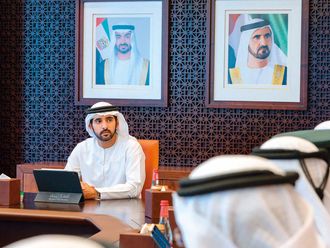Dubai: The world must not lose momentum in bringing access to quality education for children, which remains a major problem, the CEO of GEMS Education said on the sidelines of the Global Education and Skills Forum (GESF) in Dubai on Sunday.
In an interview, Dino Varkey told Gulf News it was also essential to promote a wider “global mindset” in education to counter “nationalistic and divisive” voices.
The two-day GES, held at Atlantis, The Palm, featured international experts debating the problems in education. The forum heard that around 260 million children globally don’t have access to schooling. Funding also remains an obstacle, with an estimated $1.8 trillion needed to plug an annual deficit in global spending.
Varkey described the annual GESF as a main force in addressing issues of access and promoting tolerance.
“I think access to quality education is certainly the right purpose [of GESF]. Today we have the luxury of being able to look at what elements of education are most relevant to the kind of world we are living in. Some of the issues and the trends we are seeing in different parts of the world, which, certainly if you live in a global context and you believe you are a global citizen, are alarming and worrying,” he said.
The forum had earlier heard from survivors of violence by the Boko Haram militant group, which targets ‘Western’ schools in Nigeria. Other delegates also called for more “inclusive” education to repel extremist dogma that children today can easily be exposed to on social media.
“A big part of what we are trying to achieve is to try and mobilise inspiring voices that can remind us just how important it is that we inculcate a global mindset, a global culture, a global voice; rather than some of the nationalistic, almost divisive things we are seeing in parts of the world. You hope it’s like an unstoppable force of momentum that you are building.”
GESF is an initiative of the non-profit Varkey Foundation; GEMS Education is a strategic sponsor of the event.
Varkey also spoke about the expected impact of new groups formed on Sunday to tackle education challenges. Six of the groups have been brought under the new GESF Alliances, which include Unesco, Harvard Graduate School of Education, Aga Khan Foundation, Global Partnership for Education, Malala Fund and Camfed.
Each alliance, after meeting at GESF, will convene at later points in the year to draw up ‘White Paper’ recommendations for their areas.
“The alliance is effectively a model that has been applied very successfully in the context of other forums, such as The World Economic Forum... Too often when you see policy papers, they are representative of [only] one segment of what we see in education. What we are certainly trying to strive for in education is real diversity of stakeholder participation in driving and developing the right policy recommendations that we hope countries, heads of states, ministers of education will ultimately take up,” Varkey said.












